
A History of Utilitarian Ethics: Studies in Private Motivation and Distributive Justice, 1700-1875 PDF
Preview A History of Utilitarian Ethics: Studies in Private Motivation and Distributive Justice, 1700-1875
A History of Utilitarian Ethics In this landmark volume, Samuel Hollander presents a fresh and compelling history of moral philosophy from Locke to John Stuart Mill, showing that a ‘moral sense’ can actually be considered compatible with utilitarianism. The book also explores the link between utilitarianism and distributive justice. Hollander engages in close textual exegesis of the works relating to indivi- dual authors, while never losing sight of the intellectual relationships between them. Tying together the greatest of the British moral philosophers, this volume reveals an unexpected unity of eighteenth and nineteenth century ethical doctrine at both the individual and social level. Essential reading for advanced students and researchers of the history of economic thought, political economy, history of ethics, history of political thought and intellectual history. Samuel Hollander is University Professor Emeritus at the University of Toronto, Canada, and an Officer in the Order of Canada. Routledge Studies in the History of Economics 214. Money, Finance and Crises in Economic History The Long-Term Impact of Economic Ideas Edited by Annalisa Rosselli, Nerio Naldi and Eleonora Sanfilippo 215. Macroeconomic Theory and the Eurozone Crisis Edited by Alain Alcouffe, Maurice Baslé and Monika Poettinger 216. The Economic Thought of Friedrich List Edited by Harald Hagemann, Stephan Seiter and Eugen Wendler 217. Economic Crisis and Economic Thought Alternative Theoretical Perspectives on the Economic Crisis Edited by Tommaso Gabellini, Simone Gasperin and Alessio Moneta 218. Schumpeter’s Capitalism, Socialism and Democracy A Twenty First Century Agenda Edited by Leonardo Burlamaqui and Rainer Kattel 219. Divine Providence in Early Modern Economic Thought Joost Hengstmengel 220. Macroeconomics without the Errors of Keynes The Quantity Theory of Money, Saving, and Policy James C.W. Ahiakpor 221. The Political Economy of the Han Dynasty and Its Legacy Edited by Cheng Lin, Terry Peach and Wang Fang 223. A History of Utilitarian Ethics Studies in Private Motivation and Distributive Justice, 1700–1875 Samuel Hollander 222. The Economic Thought of Michael Polanyi Gábor Biró For more information about this series, please visit www.routledge.com/series/SE0341 A History of Utilitarian Ethics Studies in Private Motivation and – Distributive Justice, 1700 1875 Samuel Hollander Firstpublished2020 byRoutledge 2ParkSquare,MiltonPark,Abingdon,OxonOX144RN andbyRoutledge 52VanderbiltAvenue,NewYork,NY10017 RoutledgeisanimprintoftheTaylor&FrancisGroup,aninformabusiness ©2020SamuelHollander TherightofSamuelHollandertobeidentifiedasauthorofthisworkhas beenassertedbyhiminaccordancewithsections77and78oftheCopyright, DesignsandPatentsAct1988. Allrightsreserved.Nopartofthisbookmaybereprintedorreproducedor utilisedinanyformorbyanyelectronic,mechanical,orothermeans,now knownorhereafterinvented,includingphotocopyingandrecording,orin anyinformationstorageorretrievalsystem,withoutpermissioninwriting fromthepublishers. Trademarknotice:Productorcorporatenamesmaybetrademarksorregistered trademarks,andareusedonlyforidentificationandexplanationwithout intenttoinfringe. BritishLibraryCataloguinginPublicationData AcataloguerecordforthisbookisavailablefromtheBritishLibrary LibraryofCongressCataloging-in-PublicationData Names:Hollander,Samuel,author. Title:Ahistoryofutilitarianethics:studiesinprivatemotivationand distributivejustice,1700-1875/SamuelHollander. Description:Abingdon,Oxon;NewYork,NY:Routledge,2019.| Series:Routledgestudiesinthehistoryofeconomics;volume223| Includesbibliographicalreferencesandindex. Identifiers:LCCN2019011770|ISBN9780367243876(hardback)| ISBN9780367243890(ebk.) Subjects:LCSH:Utilitarianism--GreatBritain--History.| Philosophy,English--18thcentury.|Philosophy,English--19thcentury.| Distributivejustice--Moralandethicalaspects. Classification:LCCB1571.H592019|DDC171/.509--dc23 LCrecordavailableathttps://lccn.loc.gov/2019011770 ISBN:978-0-367-24387-6(hbk) ISBN:978-0-367-24389-0(ebk) TypesetinBembo byTaylor&FrancisBooks Dedicated to the memory of Haim Chertok z”l (1938–2018). And for Maggie Davidson-Chertok in friendship. Contents Foreword xii Introduction xiv PART 1 John Locke 1 1 John Locke, utilitarian ethics and the moral sense 3 1.1 Introduction 3 1.2 Locke’s ‘Benthamite’ categories: pleasure, pain and happiness 5 1.3 Utilitarian ethics: theological and secular features 10 1.4 Locke’s rejection of innate moral sense elaborated 14 1.5 ‘Of faith and reason’ 22 1.6 Concluding remarks 25 PART 2 Eighteenth-century moral-sense literature 29 2 Lord Shaftesbury, utilitarian ethics and the moral sense 31 2.1 Introduction 31 2.2 The public good as the ‘main end’ of virtue 32 2.3 The ‘moral sense’ or ‘sense of right and wrong’ 38 2.4 The moral sense and the public interest 39 2.5 Summary and conclusion 44 3 Two Shaftesbury critics: Bernard Mandeville and John Brown 47 3.1 Introduction 47 3.2 Bernard Mandeville 49 viii Contents 3.3 John Brown 54 3.4 Concluding remarks 60 4 Francis Hutcheson and the Hutcheson–Locke relationship 64 4.1 Introduction 64 4.2 Propaedeutics: ‘on human nature: reflections on our common systems of morality’ (1724) 68 4.3 Inquiry concerning moral good and evil (1729), Essay on the nature and conduct of the passions and affections (1728, 1769), and related documents 71 4.4 ‘Inaugural Lecture on the Social Nature of Man’ (1730) 86 4.5 A System of Moral Philosophy (1755) 89 4.6 A Short Introduction to Moral Philosophy (1747) 100 4.7 On Agrarian laws: Implications for distributive justice 105 4.8 On the Hutcheson–Locke relationship 109 5 David Hume, utilitarian ethics, the moral sense and distributive justice 115 5.1 Introduction 115 5.2 Humean utilitarianism and the moral sense 116 5.3 Distributive justice 124 5.4 Concluding note 129 6 C.A. Helvétius and David Hartley, utilitarian ethics, and the moral sense 132 6.1 Introduction 132 6.2 Mill’s perspective on Helvétius 133 6.3 De L’Esprit 134 6.4 Helvétius on policy 139 6.5 Helvétius on ethical progress 141 6.6 Helvétius and Locke 143 6.7 Hartley 144 PART 3 Adam Smith 149 7 Utilitarian ethics in The Theory of Moral Sentiments 151 7.1 Introduction 151 7.2 A literature review 152 Contents ix 7.3 On motivation versus consequences: the ‘moral sense’ and sympathy 156 7.4 More on ‘propriety’ and utility 159 7.5 On justice and punishment 163 7.6 Smith’s ‘greatest happiness’ principle 166 7.7 Concluding note: Smith in relation to Hume, Hutcheson and Bentham 169 8 Utilitarian ethics and distributive justice in The Wealth of Nations 174 8.1 Introduction 174 8.2 Smithian utilitarianism and natural rights 180 8.3 The ethics of class distribution 181 8.4 Distributive justice and reform proposals 190 8.5 Happiness and population size 193 8.6 Wage differentials 194 8.7 On the ‘lower ranks’ and the pauper population 196 8.8 Summary and conclusion 204 PART 4 Jeremy Bentham 213 9 Bentham, utilitarian ethics and distributive justice 215 9.1 Introduction 215 9.2 On benevolent motivation 216 9.3 Benevolence elaborated 221 9.4 Prospects for ethical progress 225 9.5 On self-regarding liberty and individuality 227 9.6 On economic equality 228 9.7 Summary and conclusion 233 10 Bentham in relation to Locke andthe eighteenth-century literature 237 10.1 Bentham on Locke 237 10.2 On the charge against Shaftesbury, Hutcheson and Hume 238 10.3 Bentham and Smith 245 10.4 Bentham and Helvétius 246
